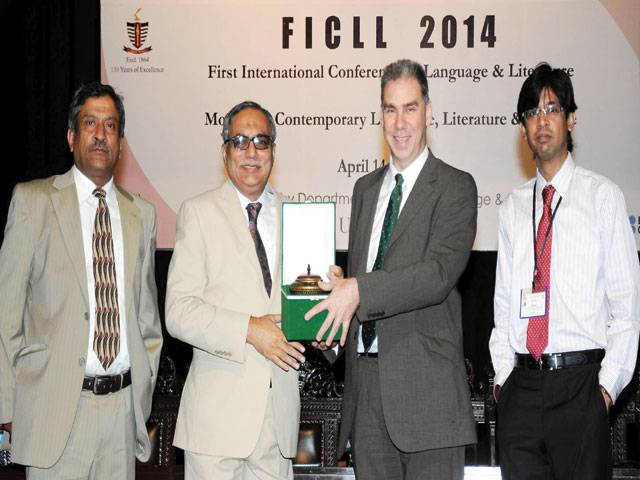LAHORE - A three-day international conference on ‘Modern and Contemporary Language, Literature and Culture 2014 (FICLL’14)’ began at the Government College University, on Monday under the auspices of British Council and Higher Education Commission to deliberate on divergent issues of individualism, ontological abstraction, social and cultural disintegration.
British Council Director Richard Weyers chaired the opening ceremony of the conference while Punjab Education Minister Rana Mashhood was the chief guest.
In his opening remarks, GCU Vice Chancellor Prof Dr Khaleequr Rahman said that more than 21 foreign delegates including five from India were participating in three-day conference which spread over 27 technical sessions; which were intended to create a rigorous debate about issues that were persistently shaping the discursive practices of modern and contemporary paradigm in literature, language and culture. He said that it was the first conference in 131 years history of GCU English Department.
Talking about the conference, FICLL’14 Secretary Dr Sajjad Ali Khan said 20th century intelligentsia had signaled a shift in philosophical, cultural, social, political and literary sensibility.
Speaking on the occasion, the education minister said that these conferences provided platform to academicians from various backgrounds to interact and exchange ideas, and such an interaction could lead to fruitful long term collaborations. He also termed the conferences an opportunity for young scholars of GCU English Department to interact with well-known writers and academicians and learn from their knowledge and experiences.
Addressing the participants of the conference, British Council Director Richard Weyers said that he had a good news for the Pakistan academia and literati that the British Council was soon going to reopen its library; which would be a state-of-the-art 21st century library with all kinds of modern facilities for research.
He that they were promoting English language at the school level especially in Punjab, saying English had become an international language and everybody should have a complete command on it. He said that the British Council was holding training courses for the school teachers to edify their skill in English language teaching.
Eminent Indian academician Dr Uttam Baburao Parekar, who is Head of the English Department at Yeshwant Mahavidyalaya, Wardha, India, said that the conference provided an opportunity to foster friendly ties between literati and academia of Pakistan and India.
“We, at India have very a wrong perception about Pakistan. Even, my family was stopping me from visiting Pakistan due to terrorism and hatred about Indians. But I am astonished that situation is vice versa here,” Dr Uttam said.
He accepted that Pakistanis were far ahead of Indians in hospitality, saying that he would never forget the love and respect he had received from there at GCU.
Riti Sharma, a post-graduation student from Department of Comparative Literature, Jadavpur University, Kolkata, said both the countries should stop inducing in their young generations hatred against each other. She said that direct interaction between the youth of both counties were mandatory to end misconceptions. She expressed her love for Pakistani food, saying that it was delicious.
Dr Carol Griffiths from ELT Department, Fatih University, Istanbul, said human-to-human relationships had been disrupted due to overstress on science and technology in the 21st century. She said they all needed to understand each other’s literature, thoughts and culture to promote peace and tolerance.
Pao Hsiang Wang, Associate Professor teaching drama and history of opera in the Department of Foreign Languages and Literatures at National Taiwan University, Taipei, said Lahore was culturally very rich, and the best venue to discuss issues of modern and contemporary literature, language, thought and culture through empirical, theoretical or methodological research papers.
Thursday, April 18, 2024
GCU literary festival on

Caption: GCU literary festival on
Stefanos Tsitsipas advances in Barcelona
4:19 PM | April 18, 2024
Met Office predicts more rains across country till April 29
2:51 PM | April 18, 2024
Punjab changes school timings for summer season
1:55 PM | April 18, 2024
Enemies of Pakistan are unable to digest investment in the country: Ataullah Tarar
1:29 PM | April 18, 2024
IHC restores Bushra Bibi's appeal for shifting to Adiala Jail from Bani Gala
1:24 PM | April 18, 2024
Hepatitis Challenge
April 18, 2024
IMF Predictions
April 18, 2024
Wheat War
April 18, 2024
Rail Revival
April 17, 2024
Addressing Climate Change
April 17, 2024
Justice denied
April 18, 2024
AI dilemmas unveiled
April 18, 2024
Tax tangle
April 18, 2024
Workforce inequality
April 17, 2024
New partnerships
April 17, 2024
ePaper - Nawaiwaqt
Advertisement
Nawaiwaqt Group | Copyright © 2024





